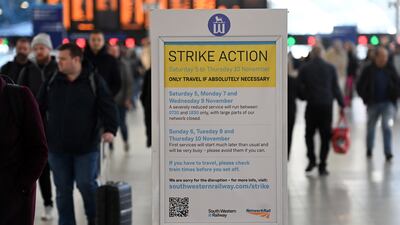Commuters arriving at UK railway stations on Monday morning found platforms deserted, staff absent and notice boards blank.
Services were disrupted despite a series of planned strikes being called off several days earlier.
Train operators still ran a reduced timetable despite the action being halted on Friday, which they said did not give them enough time to reorganise rotas. It meant some staff being paid despite not working while tracks remained train free.
Members of the Rail, Maritime and Transport union and Transport Salaried Staffs Association were set to stage walkouts in the coming few days in a long-running dispute over jobs, pay and conditions.
But RMT suspended the strikes, saying it had secured “unconditional” talks with Network Rail and the promise of a pay offer from the train operating companies.
The union said the dispute remains “very much live” and it is continuing its re-ballot of members to secure a fresh mandate for action with the result due on November 15.
Talks will now be held over the next few weeks to try to resolve the dispute over pay, jobs and conditions.
One passenger criticised operators for not having a backup plan in place in case the strike was called off.
“Have a schedule for drivers all ready to go,” said the passenger on Twitter. “They have shown themselves to be totally incompetent.”
Many workers chose to work from home for the day.
In a message to passengers, the Great Northern train company tweeted: “We are working hard to run additional trains where we can, but in general, there'll be a limited service.”
One passenger replied: “Why?”
The Rail Delivery Group, which represents the train companies, said advice remains to check before travelling.
“Unfortunately, the late notice of the suspension of strike action means that while train companies are working hard to reinstate services, some services will remain severely disrupted for our passengers into the early part of next week and our advice remains to please check before you travel,” a Rail Delivery Group representative said.
Meanwhile, a Network Rail representative said there would be “quite a mixed picture” of delays and cancellations on Monday depending on the train operator.
Widespread disruption was not expected on Tuesday and services should be running as normal on Wednesday since operators will have had time to reorganise the timetables, said the representative. Wednesday was originally planned to be another strike day.
The RMT union general secretary Mick Lynch said: “The threat of strike action and our strongly supported industrial campaign has made the rail employers see sense.
“We have always wanted to secure a negotiated settlement and that is what we will continue to push for in this next phase of intensive talks.
“Our priority is our members, and we are working towards securing a deal on job security, a decent pay rise and good working conditions.
“Our re-ballot remains live and if we have to take strike action during the next six months to secure a deal, we will.”
Special strike timetables will remain largely in place for Monday but some operators plan to run more services than on Saturday and hope they will be back to normal by the middle of the week.
The RMT union said Network Rail had originally declared talks closed and was intent on imposing changes to maintenance without union agreement.
“They have now rowed back and will continue discussions on the basis that 'nothing is agreed until everything is agreed',” the RMT said.
“This takes away the reason for the current phase of action and means talks can continue without pre-conditions unilaterally set down by the company.”
UK Transport Secretary Mark Harper said the suspension of the strikes was a “positive development”.
“We encourage unions and employers to continue their negotiations and calling off these strikes has given those talks a better chance of success,” he said.
“It is vital, for passengers and workers alike, that all parties continue to work together and deliver a modern railway we can all be proud of.”
The TSSA union announced it was calling off its planned rail strikes on November 5, 7, 8 and 9 after receiving an invitation to “intensive talks” from the Rail Delivery Group.
TSSA members were due to take strike action in five different rail companies on different days over the period.
Interim general secretary Frank Ward said: “We have always said that strikes are a last resort, and we are glad to finally be invited to the first set of formal talks with train operators in months.”


